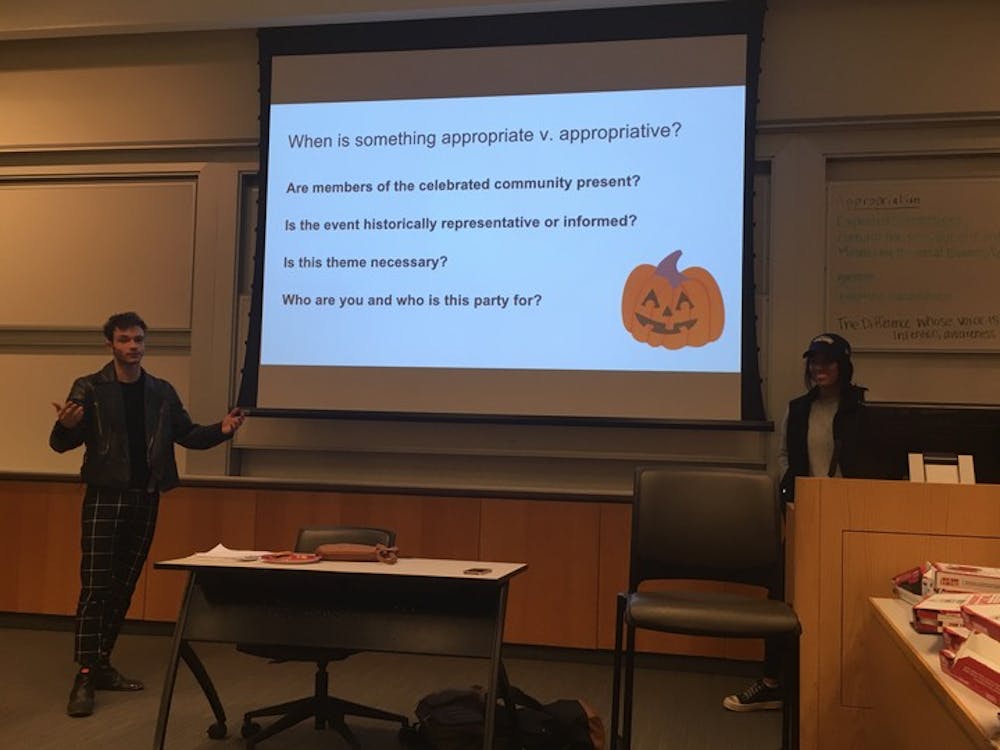Cultural insensitivity has become one of Halloween’s worst horrors, particularly on college campuses nationwide. To prevent any incidents of insensitivity this year, the Diversity and Inclusion Board, a division of the Office of Sorority and Fraternity Life, held its first workshop of the year on cultural appropriation.
The workshop, which was held in Huntsman Hall on Oct. 19, was funded by the Panhellenic Council and was open to all students, including those not involved in Greek organizations.
Event sponsors wanted to facilitate discussion at Penn surrounding cultural appropriation and “give people a mental filter,” DIB member and College senior Sarah Hinstorff said.
“What drove me to be gung ho about this event was a general culture of passivity at Penn,” DIB member and College senior Reece Sisto said. “We think that because we’re educated and go to a school like Penn, we don’t have social learning to do, and that’s false.”
During the workshop, students discussed the differences between cultural appreciation and appropriation.They cited several ways to adopt a culture positively, such as crediting the voices and experiences of those from the culture and learning the values behind traditional food and costumes.
Incidents of cultural appropriation and insensitivity have been a central area of concern for universities across the U.S., particularly during Halloween season. Penn is no exception: in 2006, President Amy Gutmann was photographed with a student dressed as a suicide bomber, causing widespread campus backlash.
The DIB workshop also referenced the 2001 incident at Auburn University where students dressed up in blackface, as Ku Klux Klan members and as Confederates. In 2013, various Greek groups from Arizona State University, Dartmouth College and Texas Tech University held parties with themes such as “Bloods and Crips” and “Sexy Border Patrol.”
“In order to assimilate, marginalized groups sometimes have to give up their cultural heritage, so having someone make fun of that exacerbates the problem,” said College senior Sesana Allen, Panhellenic Council’s vice president for diversity. “ What someone thinks is silly and fun for Halloween can mean something totally different for other friends.”
RELATED LINKS
Universities across the country warn students about insensitive Halloween costumes
'VietPong' team name at FIJI date night sparks backlash from Asian-American community
Students also debated whether Donald Trump costumes could cause discomfort for those who have lived through the consequences of his policies. They also discussed the issues involved in costume themes such as “People of Wawa” or “People of Walmart.”
“There’s still an audience here that wasn’t thinking about the complexities and the interlocking between appropriation and oppression,” DIB Chair and College senior Conrad Mascarenhas said.
Participants also discussed how to manage incidents of appropriation after they happen. Although many said a non-confrontational tone can make others more receptive to learning, Panhellenic Council President and College senior Caroline Ohlson said it is important not to “discredit [targeted groups] who respond with anger because they have every right to do so.”
“It’s not the obligation of those targeted or hurt by appropriation to respond to such events, but it is a responsibility for those who feel like they can to educate others,” Sisto said.
Ohlson agreed, adding that events like the DIB workshop can help improve the predominantly “exclusive and homogenous environment” of Greek life. College junior and Omega member Anthony Williams also said that these conversations can “help flip the negative stereotypes” of Greek groups.



